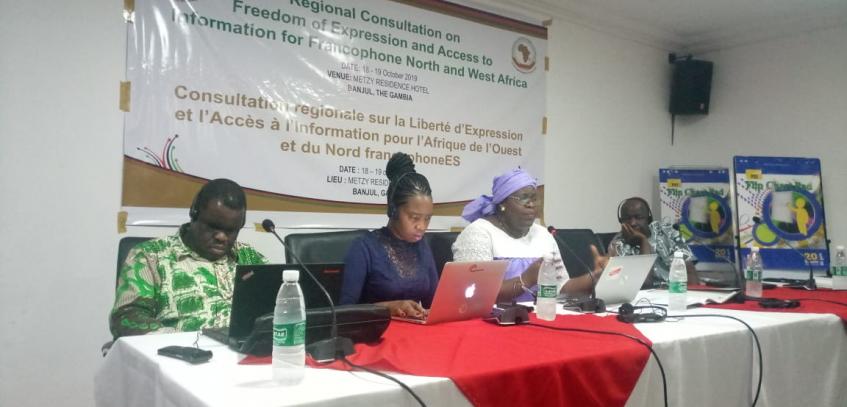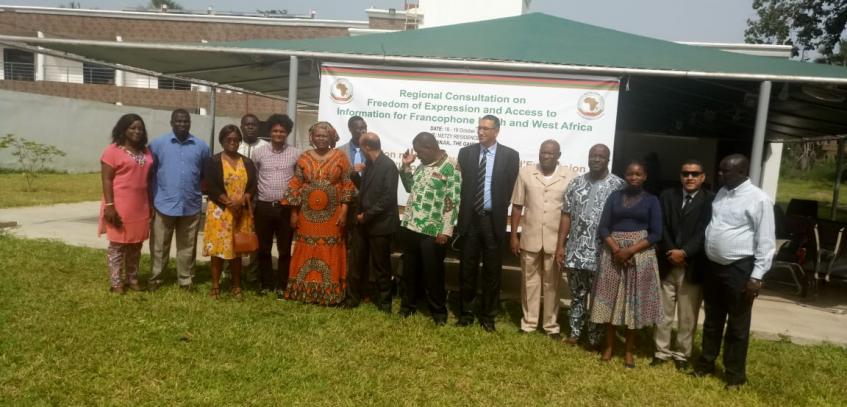The African Commission on Human and Peoples’ Rights (the Commission), through the Special Rapporteur on Freedom of Expression and Access to Information in Africa (the Special Rapporteur) convened the Regional Consultation on Freedom of Expression and Access to Information for Francophone North and West Africa (the Regional Consultation), from 18 to 19 October 2019, in Banjul, Republic of The Gambia.
The objectives of the Regional Consultation were to:
- discuss strategies for ensuring full realization of access to information;
- explore how access to information may be used to support a free and fair electoral environment; and
- strategize on ways of ensuring freedom of expression.
The Consultation was attended by twenty one (21) participants from the following States: Benin; Burkina Faso; Gabon; Mali; Mauritania; Niger; Sahrawi Arab Democratic Republic; Senegal, Togo, Tunisia; and The Gambia.The participants were drawn from various stakeholders, including: State Party representatives; representatives of information regulators who work on implementation of national access to information legislation; Media Regulatory Authorities; and Non-Governmental Organizations.
Discussions were centred on the soft law documents adopted by the Commission, spearheaded by the Special Rapporteur, namely:
- The Model Law on Access to Information in Africa, adopted in April 2013 in view of the importance of the right to seek and receive information, the Commission adopted the Model Law as a guide for States Parties to assist them in the adoption of national laws on access to information (ATI).
- The Guidelines on Access to Information and Elections for Africa, adoptedin November 2017 to elaborate on the information that should be proactively disclosed by all the role players in the elections including: the State Parties; political parties; election observer missions; the media; among others.
- The Declaration of Principles on Freedom of Expression in Africa, adopted in 2002 to elaborate on Article 9 of the African Charter on Human and Peoples’ Rights. The Declaration is currently being revised in order to include issues on freedom of expression, access to information and digital rights, which were only partly included, or not included at all in the 2002 Declaration.
Furthermore, the discussion extended to the Declaration of Principles on Freedom of Expression and Access to Information in Africa, which is being revised by the Commission pursuant to Resolution 350 (ACHPR/Res.350 (EXT.OS/XX) 2016), led by the Special Rapporteur.
The discussions highlighted the situation of access to information and freedom of expression. Issues relating to freedom of expression included: co-regulation of media; safety of journalists; restrictions related to cyber-crime laws; and regulation of the internet. With regards to access to information, highlighted issues included: the need for national legislation on access to information as elaborated in the Model Law; the need for access to information prior to, during and after elections; the need to sensitize various stakeholders on the right of access to information; the right to privacy; online bullying and harassment; and the need for translated versions of the various soft law documents, including in French, Arabic and Portuguese.
The Regional Consultation closed with a commitment to continue interacting with the special mechanism on freedom of expression and access to information, including through providing relevant information on violations of the rights to freedom of expression and access to information.
Done in Banjul, The Gambia, 19 October 2019











